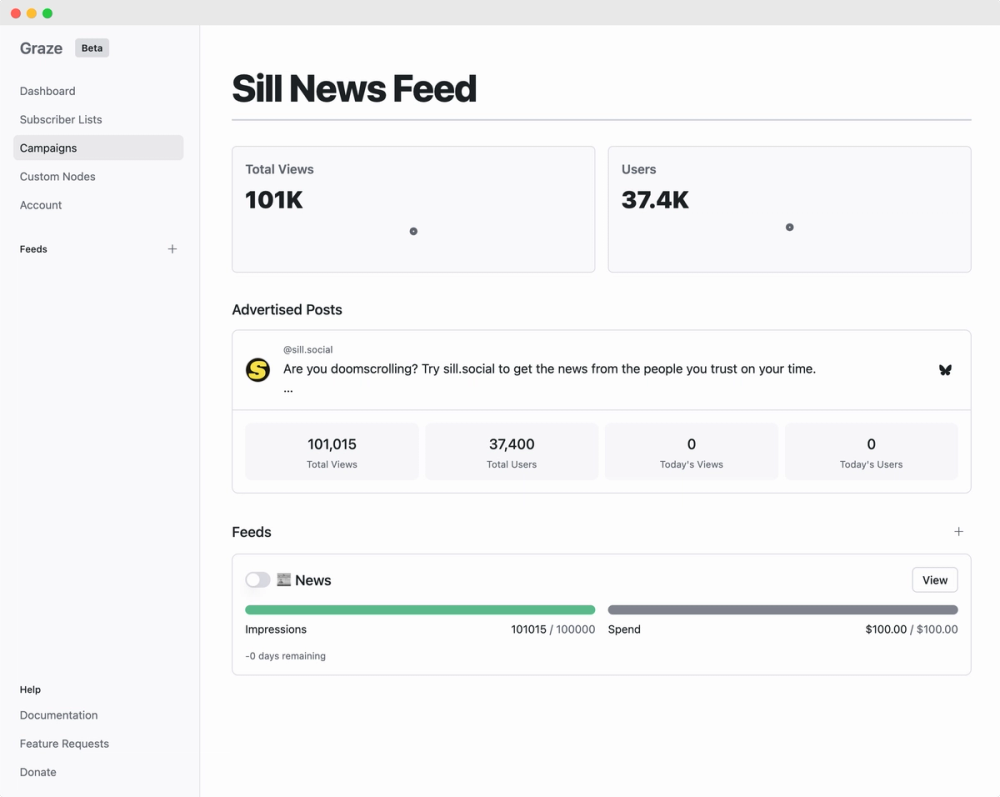
How Sill uses Graze to sponsor the news feed and grow its user base
Bluesky, and the ATProto that undergirds it, offer a once in a generation opportunity to rewire the fundamental operating system of the social web. To make this new generation of the social web thrive, we have to avoid enshittification-prone business models, and offer a better path forwards. At Graze, this mission is central to our work. Today, we’re sharing some results from a recent sponsored post campaign, and wanted to highlight how our approach to a common monetization technique is fundamentally different.
3,000 people use Graze today to design, grow, and manage custom feeds on Bluesky. We give users a really great interface with powerful tools for choosing exactly the posts you want in your feed. We also provide the infrastructure to filter, store, and host requests for feeds. In addition, Graze allows creators like Tyler Fisher and operators like Ændra Rininsland the abilit directly collaborate to their mutual benefit through our sponsored content market. Today, we’ll dive in and talk a bit about how monetization is being built on Graze for a better future of the social web.

A screenshot of the Sill.social sponsored content that ran on the News Feed
How sponsored content works on Bluesky with Graze: Ændra and Tyler
Ændra operates the Verified News feed, a live stream of media from all vetted news organizations on Bluesky. On a daily basis, her feeds reach 110–120k daily active readers, and serve almost a million feed requests per day. She’s decided to monetize her Graze-powered feeds in order to support Shoots.green, a philanthropic venture focused on funding ATProto initiatives with a focus on uplifting the 2SLGBTQIA+ community.
Tyler runs Sill, a link aggregation tool that aims to keep users quickly and efficiently informed about the content passing through their network on a day to day basis. Founded just a few months ago, it’s in early beta, and is just starting to gain traction with a user base. For Sill, getting access to news-oriented audiences that could be happy users of a link aggregation tool is super valuable.
As a sponsor, Tyler can submit campaigns to feed operators, and feed operators can in turn accept or deny those campaigns with 100% editorial control. Feed operators balance the monetary value of the sponsorship against its relevance for their audience.
In this case, the campaign was accepted, and $100 was spent for a 100k impression purchase. Over the course of a day, this post reached 37.5k distinct users on Bluesky, and ended up resulting in about 50 converted signups for Sill. Of the $100 spent, $70 was sent directly to Ændra, $3.20 was taken as a transaction fee by our payment processor, and Graze earned $26.80 in exchange for hosting and facilitating the feed as well as the sponsor market.
What’s so different?
At each point in this transaction, sponsors and feed operators have total control of who they transact with, the terms of those transactions, and whether to transact at all in the first place. Most importantly, this approach to a totally delegated sponsor market breaks the back of the most important mechanism of enshittification– market centralization. Legacy platforms allocate 100% of available reader attention, have 100% control over the commoditization of that attention, and keep 100% of the profit. That’s how platforms are corrupted.
That end-to-end control is how irrelevant ads make their way to feeds, how content engineered to keep you online all day fills your timeline, how your only recourse becomes to completely leave the platform or just accept your exploitation. In short, if attention is the currency of our time, enshittification works via a cartel-like centralization of how that attention is captured and converted into private profit.
Bluesky offers us all a new way forward, where all parties involved have responsibilities and separated powers that prevent any one system from exploiting one another. Users on Bluesky don’t get locked into any single algorithm, and instead get to choose their algorithms via custom feeds. Custom feed operators design feeds that compete for reader attention. Sponsors get to decide with whom they transact. Every actor makes affirmative choices with whom they spend their attention and money with, and the switching costs are near zero.
If a lack of choice enables legacy platforms to put us on the enshittification treadmill, meaningful choice for all actors at all times actually constrains the capacity to enshittify. A feed operator running tons of garbage sponsored content will lose readers, which will cut into the ability to generate revenue. Sponsors with exploitative ads will not be able to reach audiences since feed operators will be concerned about competition from other feeds that don’t exploit readers. Readers will be able to actually reward the algorithms that they find useful with their time and attention.
We think this is the beginning of a new positive feedback loop in place of an old, familiar business model that came to lay waste to the modern informational landscape. Instead of being taken advantage of, on Bluesky, we all have an opportunity to be empowered to start a business cultivating useful feeds, reach truly interested audiences, and engage with truly compelling content. We hope you’ll join in helping define this new way forward with us.